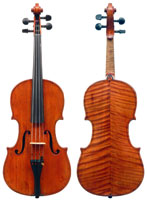|
Ref : 0800
A good French violin of Unknown Authorship
|

go to Home Page see more Violins |
This violin is beautifully toned - from an unusually rich and responsive G-string to a highly soloistic E-string full of brightness, clarity, focus and projection.It was brought to South Africa in the early 20th century by a professional Dutch violinist who used it throughout his career as orchestra musician. After his death it remained in the family, but fell into neglect and disrepair. It was acquired by this dealership around 2012 and some time later saw a full refurbishing carried out, replacing the lower block, resetting the neck to the correct elevation and with the correct overstand. Some cracks were securely repaired and the pegs have been beautifully rebushed, using ebony for the bushes - adding an interesting alure to it. As it is now, it is structurally secure and a real pleasure to play.
The violin has a carefully made handwritten label - a meticulous copy of the label in J. B. Vuillaume's 1823 violin number 4 (photo), but since this violin simply doesn't look much like the master's work and since JBV's fourth violin is currently catalogued, photographed, documented and in private ownership, this violin is manifestly not his work. Furthermore, a fake neck graft cut into the neck makes it an unlikely candidate for a high-end authorship. However, it is genuinely old as is manifested in the wear between the wintergrowth lines in the edges, and the wear of the corners and scroll - 1840 is a fair estimate.
In 2014 this violin was taken to Paris where it was examined by experts at the Maison Vatelot-Rampal, who confirmed that it had nothing to do with Vuillaume, but that it probably is of French origin, possibly even of East-European / Bohemian authorship. It was also seen by French experts Yann Porret, François Champarnaud and Christophe Depierre who all three felt it is French.
What is interesting though is that the outward-slanting Fs and open-grained top much conform to the Vuillaume School's preferences, along with a nicely-flamed two-piece back with the same maple used in the ribs.
Despite age and wear and recent repairs, it is a fascinating and charming violin. The tone, after some 175 years, is matured and noble - a real pleasure to play. Hopefully its refurbishing will give it a new lease on life for many decades, if not centuries, to come. It remains a very deserving violin.
 |
 |
 |
||
 |
Dimensions : Length of back: 35.7 cm
Condition : Structurally secure.
A complete refurbishing was carried out in 2015, which replaced the lower block, resetting the neck to the correct elevation and correct overstand. Some cracks were securely repaired and the pegs have been rebushed, using ebony for the bushes.
All work was carried out by Svend Christensen.
Provenance : This violin was brought to South Africa in the early 20th century by a professional Dutch violinist who used it throughout his career as orchestra musician. After his death it remained in the family until acquired by Johan Grobbelaar in 2012.
Price : R60 000 Approximately US$ 3 700
 |
 |
 |
 |
 |
 |
 |
 |
 |
 |
 |
 |
|||||
 |
 |